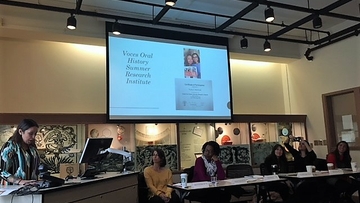The critical role of storytelling
November 1, 2018
Our stories define who we are. They allow us to connect to people of the past and preserve messages for those who will come after us. In the context of the former, The University of New Mexico’s Center for Regional Studies (CRS) recently held a forum to explore the value and versatility of oral history as it applies to research and academic study.
This summer, four faculty members and two graduate students from UNM received CRS support to attend the “Voces Oral History Research Summer Institute” at the University of Texas at Austin. Institute topics included theory and methodology of oral history, using oral history to study under-researched topics, developing an oral history project for academic research, publishing oral history research, teaching oral history to undergraduate and graduate students, archival considerations and best practices.
The attendees included: Anna Nogar, associate professor, Department of Spanish and Portuguese; Melina Vizcaíno-Alemán, associate professor, Department of English; Myrriah Gómez, assistant professor, Honors College; Natasha Howard, lecturer III, Africana Studies; Trisha Martínez, doctoral candidate, American Studies; and Julianna Wiggins, master’s candidate, Department of Spanish and Portuguese.
Following the “Voces Oral History Workshop,” the attendees returned to UNM ready to apply their new training to varied research projects. Last month, CRS sponsored a campus forum where the attendees shared what they learned in Austin with an invited audience, in order to build additional oral history capacity among UNM faculty and students. Two panels of three presenters spoke about the Institute and their research projects, followed by a Q&A session.

Anna Nogar, Ph.D. presents at the CRS Oral History Forum.
The first panel included Nogar, Gómez, and Wiggins. Nogar and Gómez are co-investigators of an oral history project about baby-boomer Nuevomexicana/os. Wiggins, their research assistant, utilizes her undergraduate journalism degree to develop effective interviewing techniques.
Their project explores a generation that expresses New Mexico’s rich cultural heritage whose voices urgently need to be documented and made accessible to the public. The project includes an interdisciplinary course in UNM’s Honors College and the Department of Spanish and Portuguese, building oral history capacity among students.
The second panel was comprised of Vizcaíno-Alemán, Howard, and Martínez. Using oral interviews in her next book, Vizcaíno-Alemán will work with artist Carlota D.R. Espinoza to tell the story of an early Chicana muralist who painted and worked in Denver, Colo. She aims to combine oral history, archival research and cultural analyses in her book. Vizcaíno-Alemán also plans to use oral history skills and methodology in a graduate seminar and an undergraduate course on Chicana/o cultural expressions. Her undergraduate course will include an oral history component.

Trisha Martínez presents at the CRS Oral History Forum.
Howard will employ oral history in her book project about the diversity of blackness in New Mexico. Much of the work on New Mexico examines Buffalo Soldiers, Black frontier life, and similar topics, but little has been done to situate Black New Mexicans as both historical and contemporary subjects. Likewise, there is little work that makes sense of Afro-Chicana and Black Indian consciousness in New Mexico. Howard’s book is intended to help fill these gaps. One of those gaps is the history of the Black community in Albuquerque’s South Broadway neighborhood, which is the focus of Howard’s current oral history research.
Martínez is using and collecting oral histories for her dissertation entitled Living the Manito Trail: Maintaining Self, Culture, and Community, which is an ethnographic interdisciplinary study that engages with Nuevomexicano communities who migrated to Wyoming. This project resonates deeply with her because her great-grandfather, Victor Sánchez, migrated with other ancestors from Valdéz, New Mexico to Wyoming in the 1930’s to work as borregueros (sheepherders). The CRS oral-history initiative provided key support for Martínez’ dissertation research aimed at disseminating important narratives about one strand of the Nuevomexicano diaspora.
